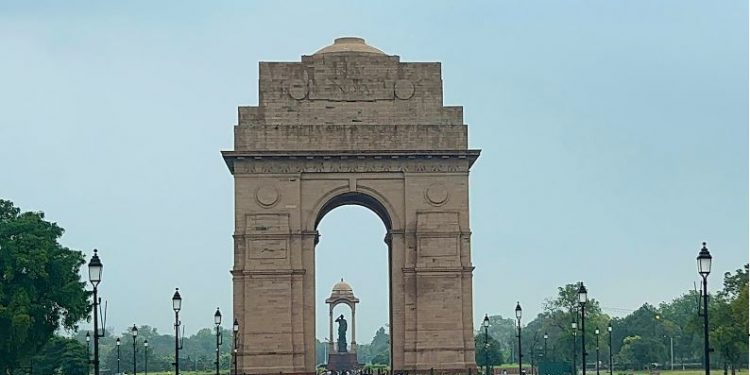New Delhi: Riding high on the ‘Modi factor’ and a targeted campaign against the Aam Aadmi Party over corruption allegations, the BJP is poised to emerge victorious on all seven seats in Delhi as it thwarted the challenge mounted by the INDIA bloc.
However, the victory margin of winners as compared to the 2019 polls reduced drastically in all seven parliamentary constituencies, with candidates of INDIA bloc partners – Congress and AAP – giving a tough fight in Chandni Chowk and New Delhi constituencies.
While the BJP suffered surprising reverses in its strongholds in Hindi heartland states like neighbouring Uttar Pradesh, Haryana and Rajasthan, the party scored a hat-trick of wins in the national capital.
The BJP’s gamble of replacing all its candidates barring one paid off.
In 2019, the votes polled by the BJP were higher than the joint tally of AAP and Congress candidates put together.
The BJP’s vote share declined from 56.7 per cent in 2019 to around 54 per cent this time. However, it is higher than the party’s 2014 vote share of 46.6 per cent.
The loss of AAP and Congress in Delhi also puts a question mark on the effectiveness of the alliance experiment.
The leaders at Delhi BJP credited the third clean sweep in a row by the party mainly to the ‘Modi’ factor and the party’s sustained attack on the Kejriwal government over its alleged involvement in corruption cases.
“We will see Prime Minister Narendra Modi taking oath for the third time. Delhi has rejected the corrupt INDIA bloc alliance and even the country has done the same thing,” Delhi BJP chief Virendra Sachdeva said.
Right from Prime Minister Modi to chief ministers of various states who campaigned for the BJP in Delhi, everyone trained their guns at the Aam Aadmi Party (AAP) calling it “kattar beimaan” (hardcore corrupt) and mocking its “unholy” alliance with the Congress.
On the other hand, the apparent lack of on-ground synergy between AAP and Congress workers and no joint rallies of the two parties ensured that voters were not too keen on supporting the alliance candidates, according to political observers.
A senior Delhi Congress leader claimed not only did the two sides fail to come together effectively on the ground but there appeared to be a trust deficit between the supporters and voters of the two parties.
“It was expected that Congress and AAP voters in different constituencies will vote for one another. The margin of votes with which BJP won means it did not translate fully on the ground,” he said.
The AAP-Congress combine can only draw solace from the fact that the victory margins for the BJP were thinner this time. While AAP bettered its vote share from the 2019 polls, the Congress took a hit this time.
AAP’s vote share rose from 18.2 per cent in 2019 to around 24 per cent this time, while Congress’ vote share of 22.6 per cent in 2019 declined to around 18 per cent this time.
The AAP failed to better its 2014 vote share of 33.1 per cent. Congress had a vote share of 15.2 per cent in 2014.
The AAP was affected in the initial phase of campaigning by the arrest of Delhi Chief Minister Arvind Kejriwal in an excise policy-related money laundering case on March 21.
Kejriwal mounted a blazing campaign in the hot summer against the BJP as soon as he was released from Tihar jail on interim bail on May 10, drawing huge crowds at rallies and roadshows but, in the end, it proved insufficient to end the BJP’s winning streak in the national capital.
AAP had claimed that sympathy for Kejriwal would impact voters, with the Delhi CM repeatedly telling people that they should vote for the INDIA bloc if they wanted him to remain out of jail.
Reflecting on the party’s poll performance, AAP Delhi state convener Gopal Rai said, “We contested the polls in adverse circumstances. The number of MPs in Punjab will increase. In Delhi, we gave a strong fight to BJP and the margins are narrow this time (as compared to 2019).”
The AAP contested a total of 22 seats: 13 in Punjab, four in Delhi, two each in Gujarat (Bharuch and Bhavnagar) and Assam (Sonitpur and Dibrugarh) and one in Haryana (Kurukshetra). The party drew a blank in Gujarat, Delhi and Assam.
The election results also set the tone for the Assembly elections next year in Delhi as the BJP, despite stamping its authority in Lok Sabha polls, has failed to dent the AAP’s prospects in the national capital.
The AAP has registered landslide victories in Delhi in 2015 and 2020 winning 67 and 62 seats respectively out of 70 constituencies but has drawn a blank in Lok Sabha polls.
The results show that AAP, despite becoming a national party, still has a long way to go before it can pose a challenge to the BJP at the national level.
The Congress, on the other hand, would be happy at the fact that their candidate from Chandni Chowk JP Agarwal was able to give some early jitters to the BJP as he was leading from the seat in the initial trends.
However, the Congress will have to work harder in the lead-up to the crucial Assembly polls next year, if it wants to make a comeback in the scheme of Delhi politics.
PTI







































